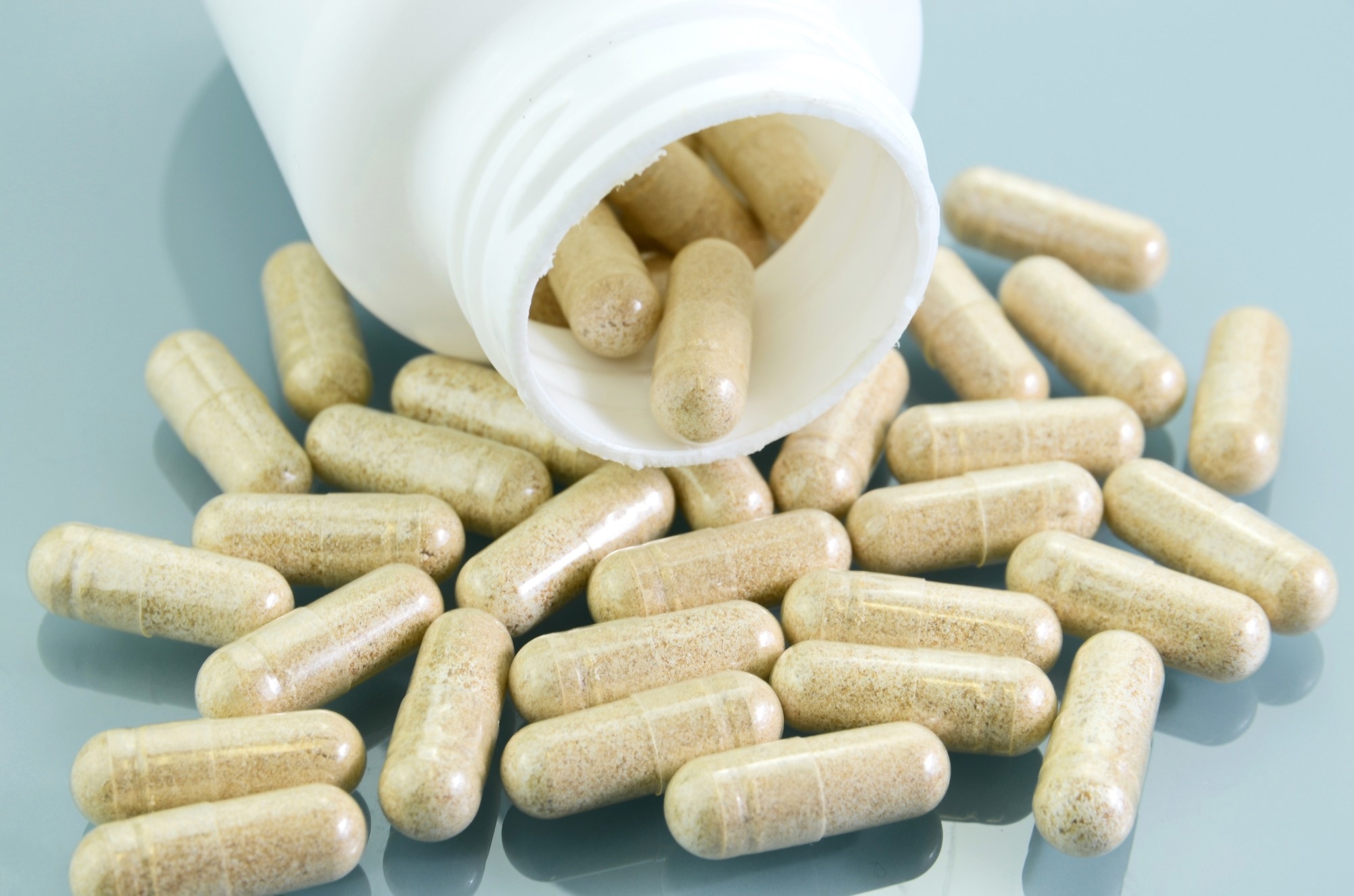Since it became clear that resveratrol was a key regulator of energy metabolism and could increase the lifespan of some animal species, the market for resveratrol supplements has increased exponentially. In fact, more than $30 million USD is spent on resveratrol supplements each year in the United States alone.
 Resveratrol Supplements. Image Credit: GetFocus / Shutterstock
Resveratrol Supplements. Image Credit: GetFocus / Shutterstock
Regulation of resveratrol
However, some things must be considered prior to initiating resveratrol supplementation.
Resveratrol supplements are not regulated by the United States Food and Drug Administration (FDA), which means their strength is unverified, and the actual concentration of the compound is unknown. Supplements may contain anywhere from 250-500 milligrams (mg) in a single capsule. In addition, their efficacy in any field of action is unproven by scientific evidence.
Most supplements today are prepared from resveratrol sourced from Japanese knotweed (Polyphenum cuspidate) or kojo-kon. Other sources for this supplement are red grape extracts or red wine extracts.
Dosage recommendations
At present, the optimal dosage in humans, if any, is unknown, as most of the experiments have been carried out in lower animal species at extremely high concentrations of pure resveratrol. Many recommendations are for 2 g a day; however, this dosage has not been confirmed by evidence.
Scientists confirm that up to 5 g can be ingested as one dose without adverse effects, but only one dose was administered in the aforementioned studies. Moreover, the effect of long-term administration of resveratrol at various doses remains unclear.
Adverse effects
This is especially important in pregnant women or during lactation. Resveratrol could also adversely affect estrogen-sensitive cancers of the breast, endometrium, or ovary because of its mixed agonist-antagonist activity. It also inhibits some key enzymes which metabolize estrogens, which could negatively affect oral contraceptive action.
Additionally, the action of resveratrol on platelet aggregation means that this compound may accentuate the antiplatelet effects of anticoagulant drugs, such as warfarin or Coumadin, clopidogrel (Plavix), dipyridamole (Persantine), and nonsteroidal anti-inflammatory drugs (NSAIDs), including aspirin, naproxen, and ibuprofen.
Even more importantly, resveratrol has been shown to minimize some favorable effects of exercise training in older men. To this end, a greater increase in the maximal oxygen uptake in the placebo group was found to arise compared to those in the resveratrol group, as well as a lowered mean arterial blood pressure in the group on placebo, but not in the resveratrol group.
In the aforementioned study, resveratrol supplementation was associated with a lack of the expected favorable effects of exercise on blood cholesterol, low-density lipoproteins (LDL), high-density lipoproteins (HDL), and triglyceride concentration. Furthermore, there was no change in other important markers of inflammation and cell adhesion that precede atherosclerosis.
Resveratrol Benefits - Human Studies Reviewed
Conclusion
Food scientists point out that the free radical scavenging activity of resveratrol in red wine is much less than that of other polyphenols also present in red wine, like caffeic acid, as established during in vitro studies. One recent study which followed the health of almost 800 older people from a central wine-making region of Italy for nearly two decades found no marked difference in death rates between those with the lowest resveratrol levels and those with the highest.
This may indicate that this polyphenol is not the most significant factor in red wine. Yet, there was no harm done, either; therefore, those who enjoy an after-dinner glass of red wine and a piece of dark chocolate can still enjoy their dessert with a clear conscience.
In short, all available evidence does not point to an effective cost-benefit ratio concerning resveratrol supplementation, and there is a striking lack of human trial-based evidence of its health benefits. This should lead to caution in taking large doses of resveratrol, especially when the aims, such as anti-carcinogenesis and lowered risk of coronary heart disease, may be achieved in other, more proven ways.
References
- Gliemann, Lasse, et al. “Resveratrol Blunts the Positive Effects of Exercise Training on Cardiovascular Health in Aged Men.” The Journal of Physiology, vol. 591, no. 20, 16 Aug. 2013, pp. 5047–5059, http://www.ncbi.nlm.nih.gov/pubmed/23878368
- Smoliga, James M., and Otis L. Blanchard. “Recent Data Do Not Provide Evidence That Resveratrol Causes “Mainly Negative” or “Adverse” Effects on Exercise Training in Humans.” The Journal of Physiology, vol. 591, no. 20, 14 Oct. 2013, pp. 5251–5252, http://www.ncbi.nlm.nih.gov/pmc/articles/PMC3810822/
- Resveratrol.” Linus Pauling Institute, 29 Apr. 2014, http://lpi.oregonstate.edu/mic/dietary-factors/phytochemicals/resveratrol
- How Resveratrol May Fight Aging.” National Institutes of Health (NIH), 12 May 2015, http://www.nih.gov/researchmatters/march2013/03252013resveratrol.htm
- Tomé-Carneiro, Joao, et al. “Resveratrol and Clinical Trials: The Crossroad from in Vitro Studies to Human Evidence.” Current Pharmaceutical Design, vol. 19, no. 34, 1 Sept. 2013, pp. 6064–6093, http://www.ncbi.nlm.nih.gov/pubmed/23448440
- Scientists Uncover New, Fundamental Mechanism for How Resveratrol Provides Health Benefits.” EurekAlert! http://www.eurekalert.org/pub_releases/2014-12/sri-sun121914.php
- http://directorsblog.nih.gov/2014/05/20/revisiting-resveratrols-health-claims/
- Xiang, Limin, et al. “Health Benefits of Wine: Don’t Expect Resveratrol Too Much.” Food Chemistry, vol. 156, Aug. 2014, pp. 258–263, http://www.ncbi.nlm.nih.gov/pubmed/24629966
- Semba, Richard D., et al. “Resveratrol Levels and All-Cause Mortality in Older Community-Dwelling Adults.” JAMA Internal Medicine, vol. 174, no. 7, 1 July 2014, p. 1077, https://jamanetwork.com/journals/jamainternalmedicine/fullarticle/1868537
- Tomé-Carneiro, Joao, et al. “Resveratrol and Clinical Trials: The Crossroad from in Vitro Studies to Human Evidence.” Current Pharmaceutical Design, vol. 19, no. 34, 1 Sept. 2013, pp. 6064–6093, http://www.ncbi.nlm.nih.gov/pubmed/23448440
Further Reading
Last Updated: Feb 26, 2024